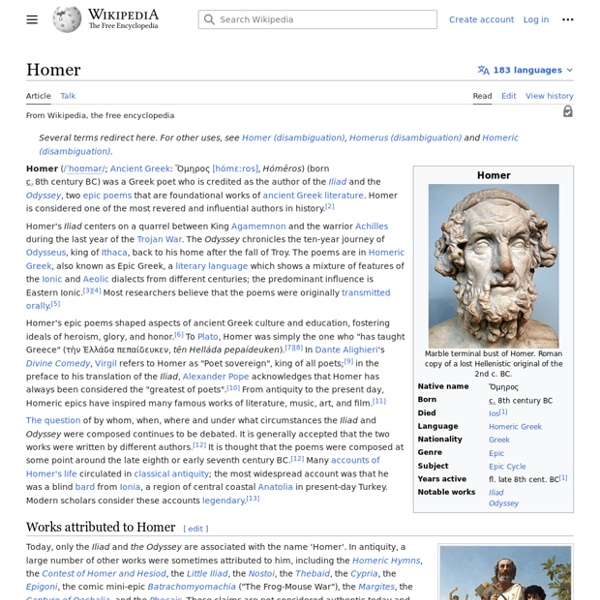Suetonius
Gaius Suetonius Tranquillus (Classical Latin: [ˈɡaːɪ.ʊs sweːˈtoːnɪ.ʊs traŋˈkᶣɪllʊs]), commonly known as Suetonius (; c. 69 – after 122 AD),[1] was a Roman historian belonging to the equestrian order who wrote during the early Imperial era of the Roman Empire. His most important surviving work is a set of biographies of twelve successive Roman rulers, from Julius Caesar to Domitian, entitled De Vita Caesarum. He recorded the earliest accounts of Julius Caesar's epileptic seizures. Other works by Suetonius concern the daily life of Rome, politics, oratory, and the lives of famous writers, including poets, historians, and grammarians. A few of these books have partially survived, but many have been lost.
Thoth
Thoth (; from Koinē Greek: Θώθ thṓth, borrowed from Coptic: Ⲑⲱⲟⲩⲧ, the reflex of Ancient Egyptian: ḏḥwtj "[He] is like the Ibis") is one of the ancient Egyptian deities. In art, he was often depicted as a man with the head of an ibis or a baboon, animals sacred to him. His feminine counterpart was Seshat, and his wife was Ma'at.[1] He was the god of wisdom, writing, hieroglyphs, science, magic, art, judgment, and the dead. Thoth's chief temple was located in the city of Hermopolis (Ancient Egyptian: ḫmnw /χaˈmaːnaw/, Egyptological pronunciation: "Khemenu", Coptic: Ϣⲙⲟⲩⲛ Shmun). Later known as el-Ashmunein in Egyptian Arabic, it was partially destroyed in 1826.[2]
Mother Nature
Mother Nature (sometimes known as Mother Earth or the Earth-Mother) is a common personification of nature that focuses on the life-giving and nurturing aspects of nature by embodying it, in the form of the mother. Western tradition history[edit] Greek myth[edit] In Greek mythology, Persephone, daughter of Demeter (goddess of the harvest), was abducted by Hades (god of the dead), and taken to the underworld as his queen. Demeter was so distraught that no crops would grow and the "entire human race [would] have perished of cruel, biting hunger if Zeus had not been concerned" (Larousse 152).
Hamlet
tragedy by William Shakespeare Hamlet is considered among the most powerful and influential works of world literature, with a story capable of "seemingly endless retelling and adaptation by others". It was one of Shakespeare's most popular works during his lifetime and still ranks among his most performed, topping the performance list of the Royal Shakespeare Company and its predecessors in Stratford-upon-Avon since 1879.
Pompey
First century BC Roman general and politician Gnaeus Pompeius Magnus[a] (Classical Latin: [ˈŋnae̯.ʊs pɔmˈpɛjjʊs ˈmaŋnʊs]; 29 September 106 BC – 28 September 48 BC), usually known in English as Pompey or Pompey the Great,[1] was a military and political leader of the late Roman Republic. He came from a wealthy Italian provincial background; his father had been the first to establish the family among the nobiles (Roman nobility). Pompey's success as a general while still very young enabled him to advance directly to his first consulship without meeting the normal cursus honorum (requirements for office). His success as a military commander in Sulla's second civil war resulted in Sulla's bestowing upon him the cognomen Magnus ("the Great"), after Pompey's boyhood hero Alexander the Great. Early life and political debut[edit]
Ammit
Ammit (; Ancient Egyptian: ꜥm-mwt, "devourer of the dead";[1] also rendered Ammut or Ahemait) was a demoness and goddess in ancient Egyptian religion with a body that was part lion, hippopotamus, and crocodile—the three largest "man-eating" animals known to ancient Egyptians. A funerary deity, her titles included "Devourer of the Dead", "Eater of Hearts", and "Great of Death".[3] Ammit lived near the scales of justice in Duat, the Egyptian underworld. In the Hall of Two Truths, Anubis weighed the heart of a person against the feather of Ma'at, the goddess of truth, which was depicted as an ostrich feather (the feather was often pictured in Ma'at's headdress). If the heart was judged to be not pure, Ammit would devour it, and the person undergoing judgment was not allowed to continue their voyage towards Osiris and immortality. Once Ammit swallowed the heart, the soul was believed to become restless forever; this was called "to die a second time". Influence on popular culture[edit]
Hesiod
Ancient Greek poet Hesiod (;[1] Greek: Ἡσίοδος Hēsíodos, 'he who emits the voice') was an ancient Greek poet generally thought to have been active between 750 and 650 BC, around the same time as Homer.[2][3] He is generally regarded as the first written poet in the Western tradition to regard himself as an individual persona with an active role to play in his subject.[4] Ancient authors credited Hesiod and Homer with establishing Greek religious customs.[5] Modern scholars refer to him as a major source on Greek mythology, farming techniques, early economic thought,[6] archaic Greek astronomy and ancient time-keeping. Life[edit] Hesiod and the Muse (1891), by Gustave Moreau. The poet is presented with a lyre, in contradiction to the account given by Hesiod himself in which the gift was a laurel staff. The Dance of the Muses at Mount Helicon by Bertel Thorvaldsen (1807).
Dante Alighieri
Italian poet Durante di Alighiero degli Alighieri (Italian: [duˈrante deʎʎ aliˈɡjɛːri]; Latin: Dantes), commonly known by his pen name Dante Alighieri or simply as Dante (,[1][2] also ,[3] Italian: [ˈdante]; c. 1265 – 1321), was an Italian poet. His Divine Comedy, originally called Comedìa (modern Italian: Commedia) and later christened Divina by Giovanni Boccaccio, is widely considered the most important poem of the Middle Ages and the greatest literary work in the Italian language.[4][5] In the Late Middle Ages, most poetry was written in Latin, making it accessible only to the most educated readers. In De vulgari eloquentia (On Eloquence in the Vernacular), however, Dante defended the use of the vernacular in literature.
Marcus Furius Bibaculus
Roman poet Marcus Furius Bibaculus (103 BC – ? BC), was a Roman poet, who flourished during the last century of the Republic. Life[edit] According to Jerome, he was born at Cremona, and probably lived to a great age. He wrote satirical poems after the manner of Catullus, whose bitterness he rivaled, according to Quintilian (Instit. x.i.196), in his iambics.



